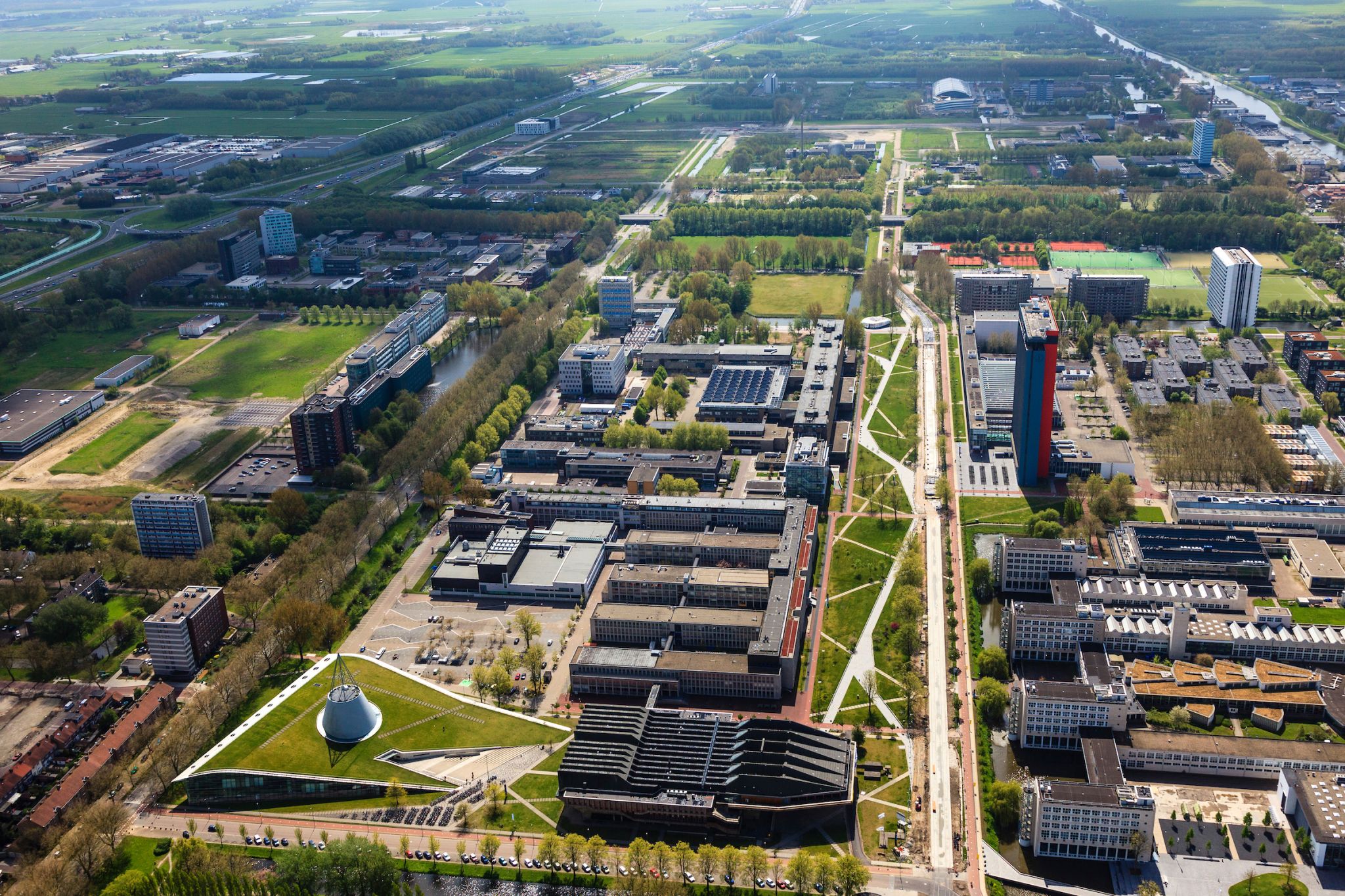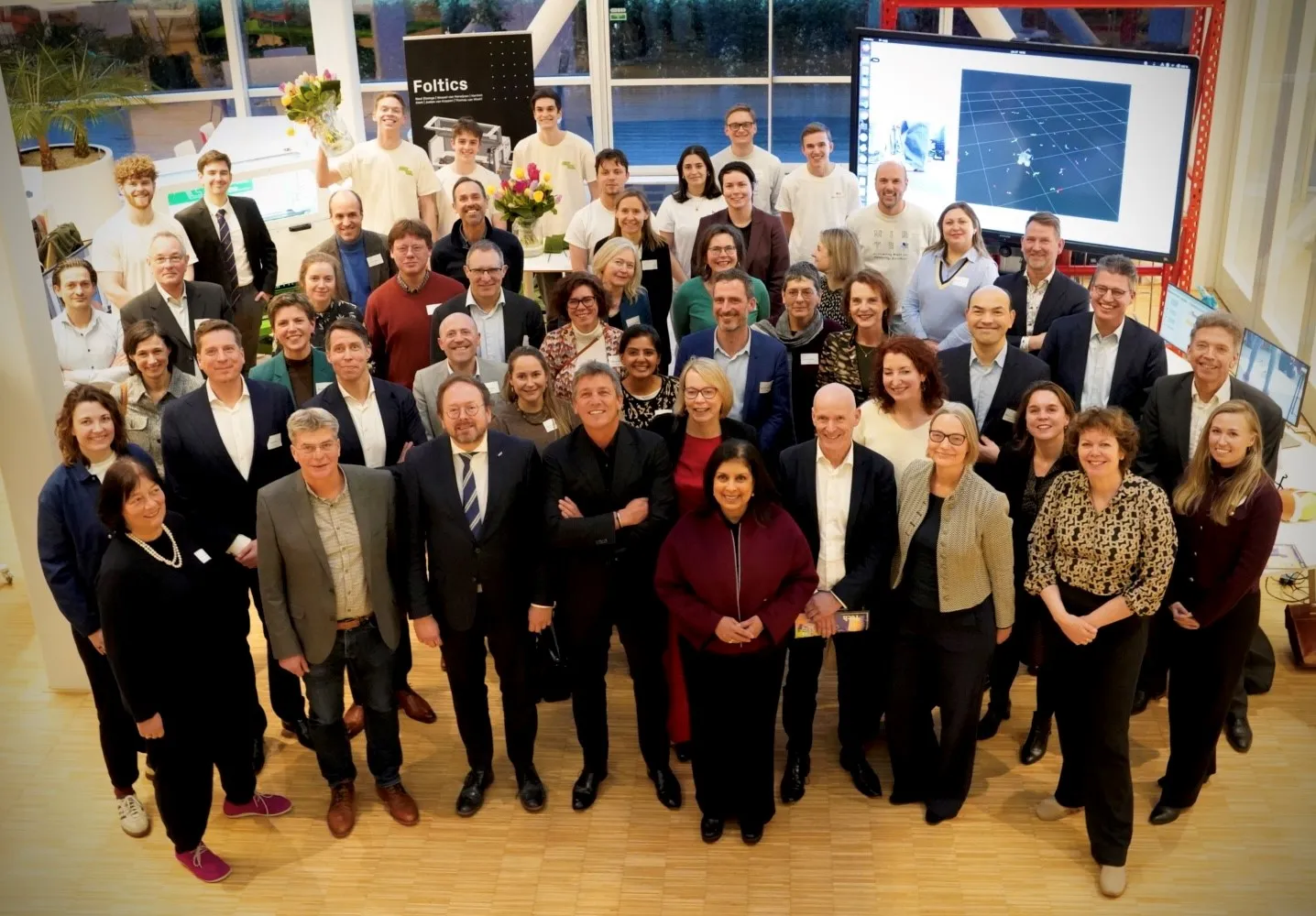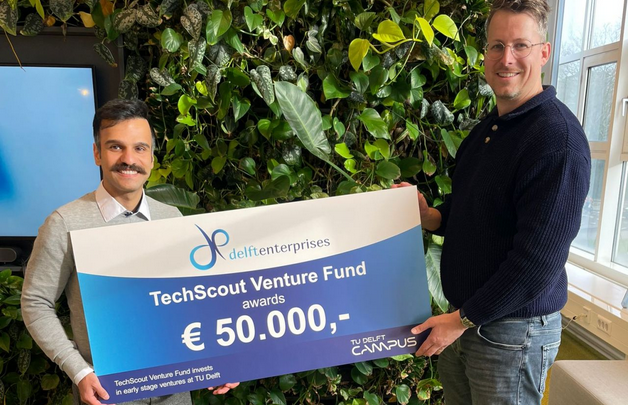During the summer recess, we look back on the impressive achievements of TU Delft field labs, which have received an innovative boost thanks to the Kansen voor West programme. This programme provides crucial subsidies that strengthen the regional economy in the Randstad and pave the way for sustainable growth. Opportunities for the West acts as the programme management agency for the western Netherlands and implements European programmes for the four Randstad provinces (North and South Holland, Utrecht, and Flevoland) and the four largest cities (Amsterdam, The Hague, Rotterdam, and Utrecht). The programmes are financed from various sources, the most important of which are the European Structural Funds (ESIF).
The vouchers are divided into three categories:
1. Advice vouchers
The following companies have received advice vouchers:
Lignitec
Wood composites, such as MDF, chipboard, and plywood, consist of chemical and petroleum-based adhesives in addition to natural fibres. This makes them harmful to health and difficult to recycle.
Lignitec offers a sustainable solution. This start-up manufactures wood composites consisting of 100% natural fibres and adhesives, making them recyclable and renewable.
After extensive lab testing, Lignitec is ready for the next step: conducting research in a realistic, practical setting. This start-up is now testing its material in a piece of furniture. The table is located in the Office Lab, where visitors and colleagues can use it.
Buitink Zeilmakerij Duiven B.V.
The use of sandbags during flooding usually requires a large amount of material, manpower, and time. Various alternative flood defences can now be found at the Flood Proof Holland test polder, including, most recently, the Buitink Flexible Water Dam. TU Delft students Lucas Leerdam and Gerben van Riet investigated how this flood defence functions under various (extreme) conditions and what improvements are possible.
The initial study was a success, highlighting both the strengths and weaknesses of the Buitink Flexible Water Dam. Johan de Kuijper of Buitink Technology says he is pleased with the research at Flood Proof Holland: “It’s fantastic that we were able to test the dams scientifically at this location, where you literally have your feet in the clay. We will definitely use the results of this initial study to improve the product.”
Geo Insights V.O.F.
Climate change poses ever greater challenges for urban areas, such as flooding, heat stress, and drought. Although a great deal of data and models are already available, there is often a lack of a comprehensive overview that is crucial for making well-informed decisions about sustainable urban development.
Geo Insights is developing an innovative tool that combines geographic information systems (GIS) and machine learning to better predict these risks and evaluate the impact of climate-adaptive solutions. The system also considers the economic, social, and ecological costs and benefits.
The prototype is being developed and tested at The Green Village using data from the WaterStraat and the HittePlein, among others. Geo Insights also wants to seamlessly integrate the tool with existing systems used by municipalities and water boards, so that they can make informed choices for a resilient city.
Omlab
In the Netherlands, sloping embankments (taluds) are often protected against erosion using fossil-based materials such as plastic honeycomb mats, geotextiles, or concrete tiles. These materials leave waste in the soil and offer little space for nature. There is another way! Omlab has developed the Biotalud tile: a circular, biodegradable, and nature-positive alternative.
This 3D-printed tile is made from residual flows from (waste) water treatment, such as cellulose and calcite. The soil-specific mixture is combined with natural binders and a native seed mix. This creates a smart solution that combats erosion and enriches soil life. While the slope stabilises, plants and roots grow, eventually taking over the reinforcing function of the tile. After decomposition, nothing remains – except a strong, biodiverse slope.
At The Green Village, Omlab is working with Rethink Materials for Infranature to investigate how erosion-resistant the tile is and how well the root network develops. The tile is a promising example of building according to the principle: “concrete where necessary, nature-positive where possible”.
Dakbloemenweide BV
Soon, more than 40 native plant species will flourish and bloom on the roofs of the Office Lab and Control Room at The Green Village. These roofs have been enhanced using Dakbloemenweide’s native green roof system, setting the stage for a new chapter in green innovation.
Two different test setups are being used: one monitors biodiversity changes using periodic plant and insect surveys, while the other evaluates temperature regulation and solar panel efficiency through real-time sensors. Both setups assess the ability of the green roof system to operate solely on collected rainwater without supplemental irrigation. These approaches help investigate how the green roof contributes to local biodiversity, natural cooling, and increased solar panel efficiency, as well as its self-sufficiency.
These insights empower Dakbloemenweide to create a scalable, self-sufficient green roof system, helping cities become more biodiverse, energy-efficient, and climate-resilient. The success at The Green Village serves as a blueprint for sustainable urban transformation.
AGS Products B.V.
A few months ago, a new tile was installed on the roof of The Green Village Office Lab. What makes it so innovative? This SlowFlow tile helps reduce flooding!
In the Netherlands, it is raining more often and harder, causing the sewer system to become overloaded and streets to flood. SlowFlow from AGS Products BV offers a smart and simple solution for flat roofs. The system consists of a tile-weighted aluminium delay ring with small openings placed around the drain. This allows the roof to act as a temporary buffer and delays the drainage of rainwater.
At The Green Village, we are testing how SlowFlow functions under different (weather) conditions and collecting feedback from end users.
BTscout
The beaver population in the Netherlands has grown significantly in recent years. Although these animals play an important ecological role, their presence also poses an increasing challenge to water safety. Beavers dig extensive systems of tunnels and burrows in riverbanks and dykes. When these tunnels are deep enough, they can affect the stability of a dyke. During high water or prolonged rainfall, there is a risk of subsidence or even dyke breaches.
Current inspection methods are inadequate, especially at critical moments such as during high water. Young entrepreneurs Kenley van Rossen and Karina Kovalska (Delft University of Technology) saw this as both a necessity and an opportunity: better detection and inspection using a robot.
BTScout is a small robot that can detect and inspect beaver burrows in dykes, both above and below water. The prototype can move through narrow passages and, with the aid of cameras and sensors, provide insight into the structure and impact of beaver burrows. In a small test setup at the Flood Proof Holland test site, we have simulated beaver passages in a test dyke. Here, both the technical and practical feasibility are being investigated.
Medeina
The Green Village has welcomed some new residents: the worms from Medeina Engineering!
Every year, a huge amount of sludge is dredged in Europe. Dehydrating it for reuse takes a lot of time, space, and energy. Medeina is investigating whether plants and locally bred worms can accelerate this process naturally and more cleanly.
Water can escape through the worms’ tunnels, and plants use these tunnels to root deeper. The treated sludge thus gains greater biomass, enabling it to store carbon and improve the soil.
Using a test setup at The Green Village, Medeina is investigating how the worms move through the sludge and the impact this has on the growth rate of plant roots. She is also investigating whether willow roots can stabilise heavy metals in the sludge, making reuse safer.
Obscape
Heavy rainfall in urban areas will become increasingly common. The growing risk of flooding and waterlogging underscores the need for systems that can more effectively measure, monitor, and predict rising water levels.
At Flood Proof Holland, Obscape is testing two innovative sensors: a radar-based water level meter and a time-lapse camera. The aim is to investigate whether these sensors can together form an effective early warning system.
The compact system has integrated solar panels and communicates via 4G, making it quick to install in locations without mains power or an internet connection. This makes the application particularly interesting for smaller rivers and streams that can cause significant disruption in a short period, such as in Limburg in 2021.
2. Settlement vouchers
The following innovative companies have received settlement vouchers:
- DuckDuckGoose
- Perciv AI
- Lyla
Thanks in part to the settlement voucher from Kansen voor West III, DuckDuckGoose, Perciv AI and Lyla will be able to establish themselves at Mondai House of AI.
3. Pilot vouchers
Lastly, Robohouse received a pilot voucher. This voucher is designed to help scale up innovations or hire scaling expertise.
We would like to thank the Kansen voor West programme for their support in strengthening innovation and growth in our region. These initiatives are crucial for promoting a dynamic and sustainable economy in the Randstad. With these subsidies, the selected field labs can not only further develop their projects but also make a lasting impact on the economic progress of the region. Together, we are building an innovative future.
![]()
![]()



